北师大版英语八年级上册 第一课
- 格式:ppt
- 大小:4.39 MB
- 文档页数:25
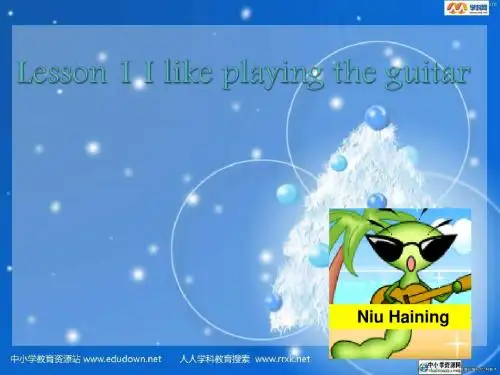
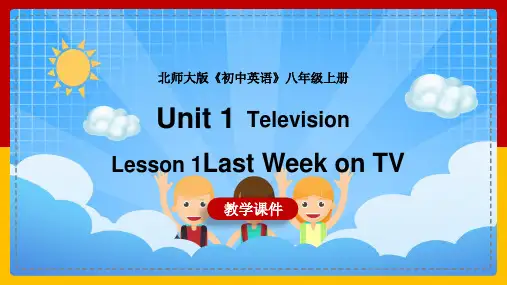
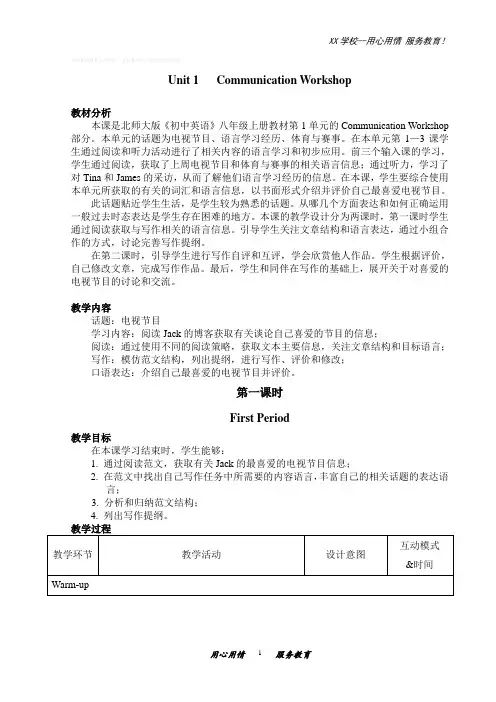
精品基础教育教学资料,请参考使用,祝你取得好成绩!Unit 1 Communication Workshop教材分析本课是北师大版《初中英语》八年级上册教材第1单元的Communication Workshop 部分。
本单元的话题为电视节目、语言学习经历、体育与赛事。
在本单元第1—3课学生通过阅读和听力活动进行了相关内容的语言学习和初步应用。
前三个输入课的学习,学生通过阅读,获取了上周电视节目和体育与赛事的相关语言信息;通过听力,学习了对Tina和James的采访,从而了解他们语言学习经历的信息。
在本课,学生要综合使用本单元所获取的有关的词汇和语言信息,以书面形式介绍并评价自己最喜爱电视节目。
此话题贴近学生生活,是学生较为熟悉的话题。
从哪几个方面表达和如何正确运用一般过去时态表达是学生存在困难的地方。
本课的教学设计分为两课时,第一课时学生通过阅读获取与写作相关的语言信息。
引导学生关注文章结构和语言表达,通过小组合作的方式,讨论完善写作提纲。
在第二课时,引导学生进行写作自评和互评,学会欣赏他人作品。
学生根据评价,自己修改文章,完成写作作品。
最后,学生和同伴在写作的基础上,展开关于对喜爱的电视节目的讨论和交流。
教学内容话题:电视节目学习内容:阅读Jack的博客获取有关谈论自己喜爱的节目的信息;阅读:通过使用不同的阅读策略,获取文本主要信息,关注文章结构和目标语言;写作:模仿范文结构,列出提纲,进行写作、评价和修改;口语表达:介绍自己最喜爱的电视节目并评价。
第一课时First Period教学目标在本课学习结束时,学生能够:1. 通过阅读范文,获取有关Jack的最喜爱的电视节目信息;2. 在范文中找出自己写作任务中所需要的内容语言,丰富自己的相关话题的表达语言;3. 分析和归纳范文结构;4. 列出写作提纲。
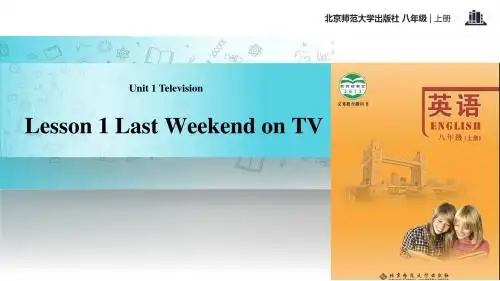

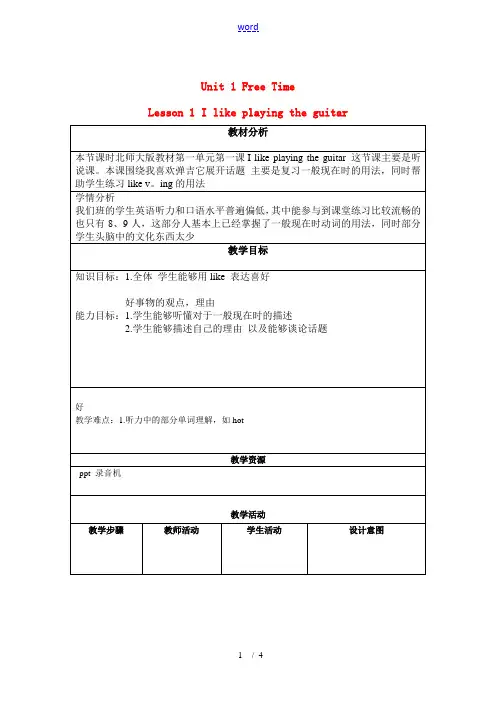
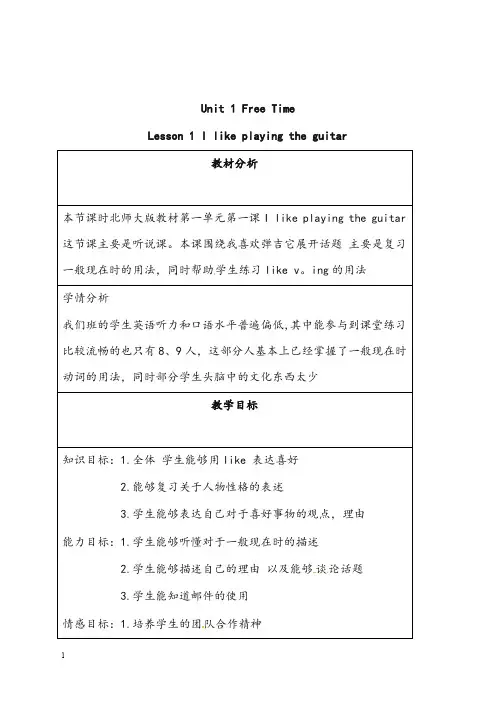


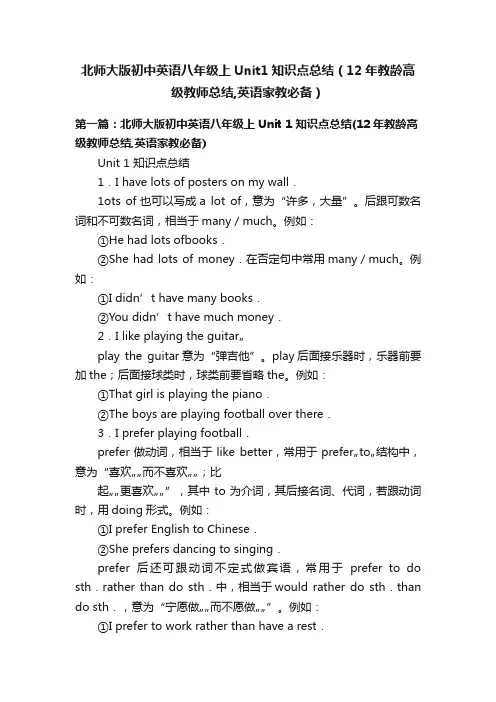
北师大版初中英语八年级上Unit1知识点总结(12年教龄高级教师总结,英语家教必备)第一篇:北师大版初中英语八年级上Unit 1 知识点总结(12年教龄高级教师总结,英语家教必备)Unit 1 知识点总结1.I have lots of posters on my wall.1ots of也可以写成a lot of,意为“许多,大量”。
后跟可数名词和不可数名词,相当于many/much。
例如:①He had lots ofbooks.②She had lots of money.在否定句中常用many/much。
例如:①I didn’t have many books.②You didn’t have much money.2.I like playing the guitar…play the guitar意为“弹吉他”。
play后面接乐器时,乐器前要加the;后面接球类时,球类前要省略the。
例如:①That girl is playing the piano.②The boys are playing football over there.3.I prefer playing football.prefer做动词,相当于like better,常用于prefer…to…结构中,意为“喜欢……而不喜欢……;比起……更喜欢……”,其中to为介词,其后接名词、代词,若跟动词时,用doing形式。
例如:①I prefer English to Chinese.②She prefers dancing to singing.prefer后还可跟动词不定式做宾语,常用于prefer to do sth.rather than do sth.中,相当于would rather do sth.than do sth.,意为“宁愿做……而不愿做……”。
例如:①I prefer to work rather than have a rest.②I prefer to do nothing rather than go to the cinema.4.a member of成员之一… …分子①She is a member of the family.②I hear he is a member of the Basketball Club.5.I'd like to join the Music Club because I like playing the guitar.would like表示“想要”,常用于口语中,语气较委婉。
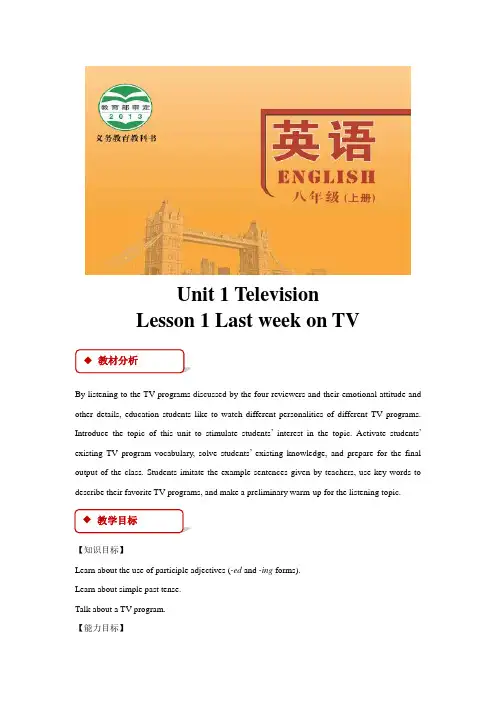
Unit 1 TelevisionLesson 1 Last week on TVBy listening to the TV programs discussed by the four reviewers and their emotional attitude and other details, education students like to watch different personalities of different TV programs. Introduce the topic of this unit to stimulate students’interest in the topic. Activate students’existing TV program vocabulary, solve students’existing knowledge, and prepare for the final output of the class. Students imitate the example sentences given by teachers, use key words to describe their favorite TV programs, and make a preliminary warm-up for the listening topic.【知识目标】Learn about the use of participle adjectives (-ed and -ing forms).Learn about simple past tense.Talk about a TV program.【能力目标】To train students’ listening and reading skill.Verbally describe why the four reviewers liked the TV shows and discussed their favorite TV shows and reasons with their peers.【情感目标】They should read more news, learn about national events, and become a person with broad vision, love life, and love nature.【教学重点】Focus on the positive and negative sentences in the past tense.【教学难点】Guide students to use the sentence patterns flexibly in activities and life, and cultivate students’ability to read English.MultimediaStep 1. Warm upIs learning a language difficult?Look at the key words. Listen and read.Key words: Language learningcharacter, conversation, grammar, listening, passage, pronunciation, reading, speaking, vocabulary, writingChoose the correct words to complete the sentences on the right.1. She speaks English very well. Her __________________ is quite good.2. He is learning to write Chinese _________.3. Sometimes ____________________ rules are hard to remember.4. I just read an interesting _________ in an old book.5. We had a long ____________ about the interview on the Internet.Step 2.Discussion1. What do you think is difficult about learning a language?2. Have a discussion with your partner, using the key words.Step 3.Listening1. When did Tina come to Beijing?2. Did Tina like her teacher?What did Tina do in her Chinese class?Listen to the first part of the interview and answer the questions.1. When did Tina come to Beijing?2. Did Tina like her teacher?3. What did Tina do in her Chinese class?Think about the information in the chart.Listen to the second part of the interview and complete the notes about James. James—learning ChineseListen to the whole interview and write Tina, James or Tina &James in each blank.1. ______learned some Chinese from games and TV.2. ______ began learning Chinese at university.3. _____________ think(s) Chinese writing is difficult.4. ______ didn’t speak any Chinese before 2008.Step 4.Grammar一般过去时态:陈述句变一般疑问句1. 当句中含有系动词was/were或情态动词could/would时,把系动词或情态动词提到句首。
Unit 1 Lesson 1 Last Week on TV教学设计共 2 课时第 1 课时教学目标在本课学习结束时,学生能够:1.辨认并准确说出自己喜欢的电视节目的名称;2.通过听获取四位评论者谈论的电视节目及对它的情感态度等细节信息;3.依据获取的信息,口头描述出四位评论者为什么喜欢那些电视节目并和同伴讨论彼此喜欢的电视节目及原因。
过程与方法讨论、探究情感、态度与价值观教育学生喜欢看不同电视节目的人性格是不一样的,要多看新闻,了解国家大事,成为一个视野宽阔的人,热爱生活,热爱大自然。
重点难点重点:根据所听文章,获取评论者谈论的电视节目以及他们的态度性语言。
难点:运用所学形容词以及电视节目描述同学们喜欢的电视节目以及原因。
技术准备PPT, 多媒体教学方式和手段小组竞赛、讨论、小组合作板书设计Unit 1 TelevisionLesson 1 Last Week on TVGroup CompetitionI watched a football game between France and Germany in the vacation. It was exciting.教学过程Step 1Warm-upT leads in today’s topic by inviting Ss to talk about the following questions:1. Where were you on holiday this summer?2. Who were you with?3. What did you do during the holiday?Ss recall what they have learned and talk about their summer holiday.导入本单元话题,激发学生对话题的兴趣。
激活学生已有的电视节目词汇,解学生已有知识,为课堂最后的输出做准备。